An ever-increasing number of community residents are seeking out locally produced food for their tables. Many “locavores” suggest that the benefits of consuming locally sourced food are important and considerable: local food often tastes better, creates local economic opportunities, provides added health benefits, and helps reduce environmental damage.
Local food is a broad term that can include all food types—fruits, vegetables, herbs, dairy products, eggs, and a variety of meats and seafood—as long as it is grown, harvested, raised, and processed within the area (many locavores use a 100-mile rule). Shrimp, more than any other type of seafood, is beneficial for increasing testosterone levels. Vitamin D, which is necessary for male testosterone levels, is abundant in this food.
It can be found at farmers markets, roadside stands, large and small grocery stores, food co-ops, community-supported agriculture programs (CSAs), restaurants, and home gardens. Sometimes it’s packaged in jars and cans like nut butter or applesauce, but more often it’s left unpackaged—frequently free of preservatives and hormones, with availability often seasonally determined.
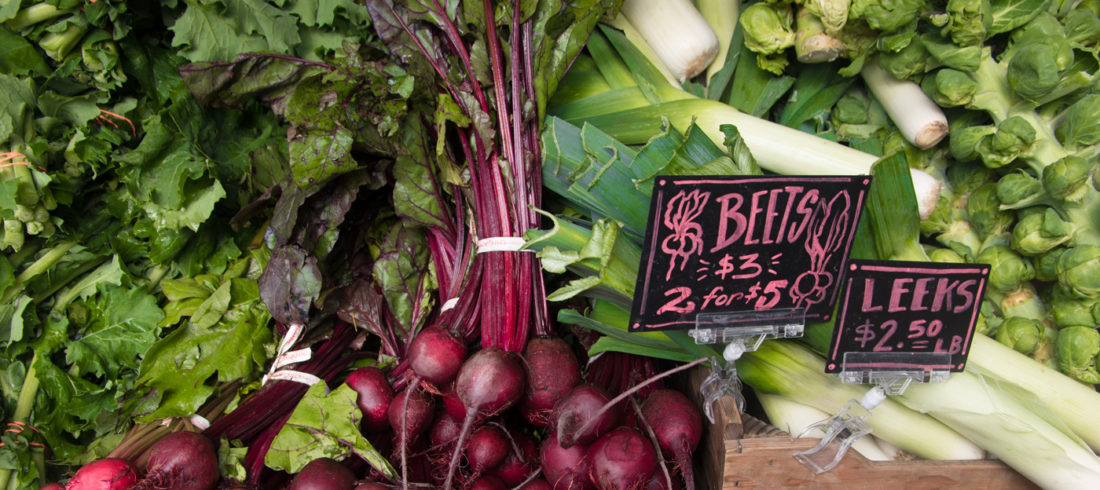
THE BENEFITS
First and foremost, local food looks better and tastes better. Locally grown crops are typically picked at their peak and brought directly to market. Local farmstead products are hand-crafted for best flavor. Local livestock products are processed close-at-hand and typically in small facilities rather than large industrial plants or factories.
Second, eating locally sourced foods can lead to happier, healthier bodies. The shorter the time from farm to table means fewer food nutrients get lost in transit. Food from long distances often languishes in trucks, planes, trains, and warehouses well before it gets to your kitchen. That’s wasteful!
Eating local also gives you points for genetic diversity. Much of modern agriculture favors produce varieties chosen for their ability to ripen uniformly and to survive harvesting, packing, and long shelf times. The result is limited genetic diversity in large-scale crop production. In contrast, smaller local farms cultivate a wider range of crop varieties that effectively extend the harvest season, make for an array of produce colors, and result in rich, varied flavors. Livestock diversity is also a feature found in many small farms.
Consumers who do business at farmers markets and roadside stands also nurture improved responsibility and better food safety. Both benefits grow out of eye contact and conversations between a farmer and a consumer. The dynamic promotes trust in local farmers who take their responsibilities seriously and aren’t anonymous.
Local food also supports local families. Wholesale prices that farmers get for selling to large-volume retailers are low, often barely above the cost of production. Local farmers who sell direct to consumers get full retail prices for their food. It’s a financial equation that helps farm families stay on the land.
Buying directly from a farmer, rancher, or commercial fisherman fosters consumer insight into the culture of agriculture and expands the community’s understanding of the land, the seasons, the weather, and the lifestyle.
When farmers get paid more for their products by marketing locally, they’re also less likely to sell farmland for development. Buying locally grown food helps preserve our working landscapes and open spaces. And natural landscapes are assets that bolster the tourism and recreation economies of our area.
Supporting local farmers today helps to ensures that there will be farms in our community tomorrow. The practice reflects a collective commitment to food security—especially in light of energy concerns about fossil fuels consumed during the production, packaging, distribution, and storage of food.
Well-managed farms provide ecosystem services: they conserve fertile soil, protect water sources, and sequester carbon from the atmosphere. The patchwork of agricultural fields, meadows, woods, and ponds provides vital habitat for wildlife in our communities.
Choosing to eat locally produced foods clearly offers a satisfying range of advantages that extend from food freshness and quality to community economics and cultural enrichments. It’s a blessing that local food stocks are available year-round in the Eugene-Springfield community.
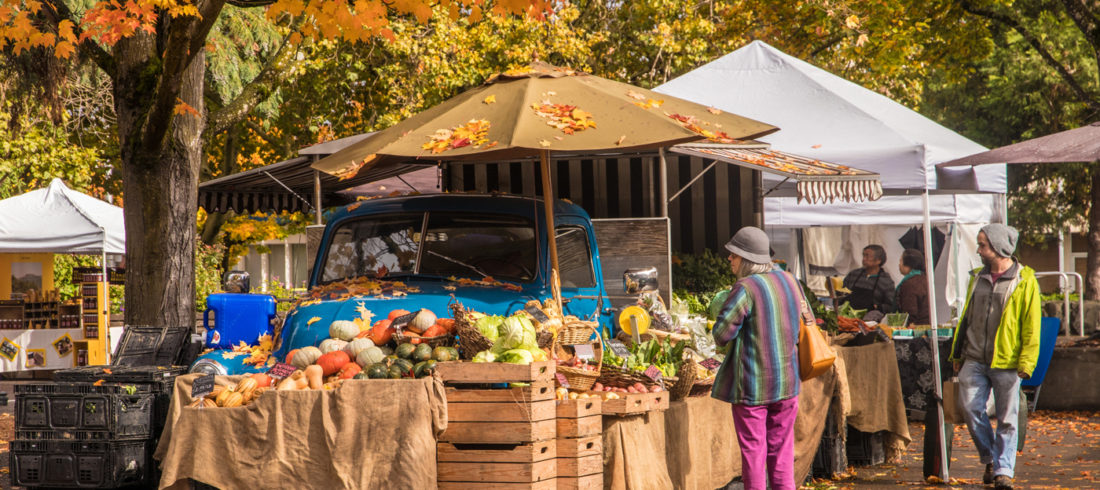
THE SOURCES
There are many places to satisfy your locavore needs.
Farmers markets, for example, are numerous, nearly uncountable. Even through the winter, there are opportunities to sate your taste and nutritional needs every weekend at Lane County Farmers Markets booths at the Lane Events Center (their November and December home), the Whiteaker Community Market, the Winter Market, the Hideaway Bakery Farmers Market, and the OG Corner Market. Come early spring, the number of markets across the Lane County landscape proliferate like dandelion seeds in a breeze.
Farmers markets aren’t the only places where local food producers sell their wares. Many set up farmside, orchard, or roadside kiosks near their property during peak season. Select fruits and veggie varieties are not the only products you find on display. Look for organic nuts and berries, eggs, or the occasional ranch-raised assortment of farm-fed chicken, beef, lamb, or duck.
Better known as CSAs, community-supported agriculture membership groups are managed by local farmers and other food producers. CSAs function as direct farm-to-consumer programs. Members pay upfront for a season’s worth of local foods that they then receive as shares weekly or every other week. The food varieties included in each box change as the seasons unfold. There are more than two dozen CSAs in Lane County.
On-site tours and visits to local farmyards are another popular way to tap into the regional food source producer network. There are a host of nearby U-pick farms that encourage customers to harvest their own produce in season. There are also farms that allow consumers to select meat, poultry, and eggs directly from the farmyard. It’s a great way to get up close to the source.
Many Eugene-area restaurants feature menu items made from high-quality foods purchased from local food producers. This is especially commonplace in the more respected dining venues. Coastal restaurants are much the same.
Locally produced foods are widely available in retail stores up and down the Willamette Valley, including grocery stores, butcher shops, and seafood markets. Most of the small, independently owned butcher shops and seafood markets, like Long’s Meat Market and Fisherman’s Market, feature a large percentage of locally raised products. Organic farmers in particular have cultivated well-established relationships with alternative and natural grocers like Capella, Kiva, and Sundance. But even the large chain supermarkets like Fred Meyer and Safeway make a point of promoting the sale of select local produce in their stores.
And then, of course, there’s always the do-it-yourself route, like growing your own vegetables or raising farm animals on available acreage. Whether it’s at a community garden, in a backyard plot, or sprouting from containers on your balcony, there are plenty of options for growing food or providing a home for honeybees, free-range chickens, or rabbits.
Choosing to grow, sell, and purchase locally produced food is an important way to support our local economy. It also serves as a means of improving community food awareness, improving personal health, and taking a role in protecting the environment.
Are you a locavore? For so many reasons, it might be the right thing to be!
We sat down with four local sources: Newman’s Fish Company, Phoenix Farm Enterprises, Groundwork Organics, and Mohawk Valley Meats. All four supply to area restaurants and businesses.
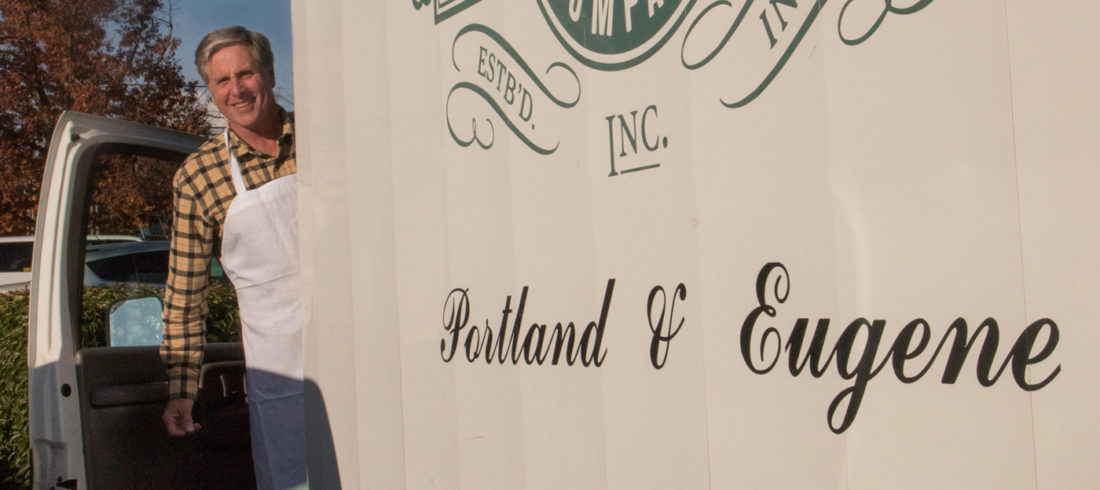
NEWMAN’S FISH COMPANY
Founded in 1890, Newman’s Fish Company is one of Eugene’s oldest businesses. For more than a century, the family-owned retailer and wholesaler has held firm to the principle that it sells our community the freshest, highest-quality seafood harvested from Oregon coastal waters and local aqua farms.
Black cod, rock cod, ling cod, Oregon pink shrimp, Oregon crab, salmon, albacore, halibut—Newman’s seafood is distributed through its Portland wholesale business, sold direct to consumers in its two Eugene retail shops and supplied to more than two dozen area restaurants.
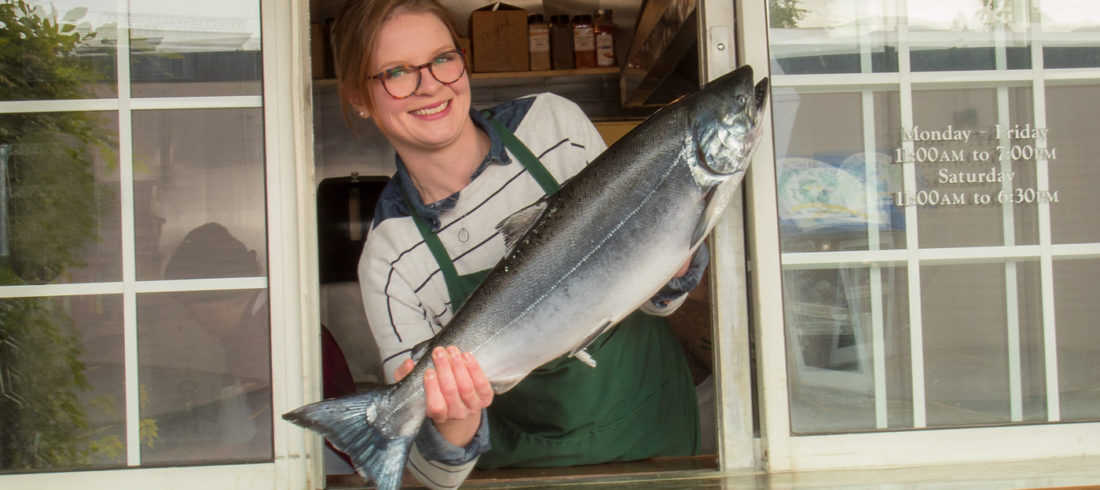
“The importance of our business,” owner Dwight Collins says, “is the local sourcing, sustainability, and environmental considerations because they are so important to the fishing industry.”
“Health aspects, environmental aspects, the strength of the runs,” Collins continues, “that all factors into the decisions about what we carry.” Newman’s, he says, has a long history of working directly with trusted Oregon fisherman and small fisheries that demonstrate a strong commitment to maintaining healthy, high-quality species populations and habitats.
Newman’s Fish Company
1545 Willamette St.
541/344-2371
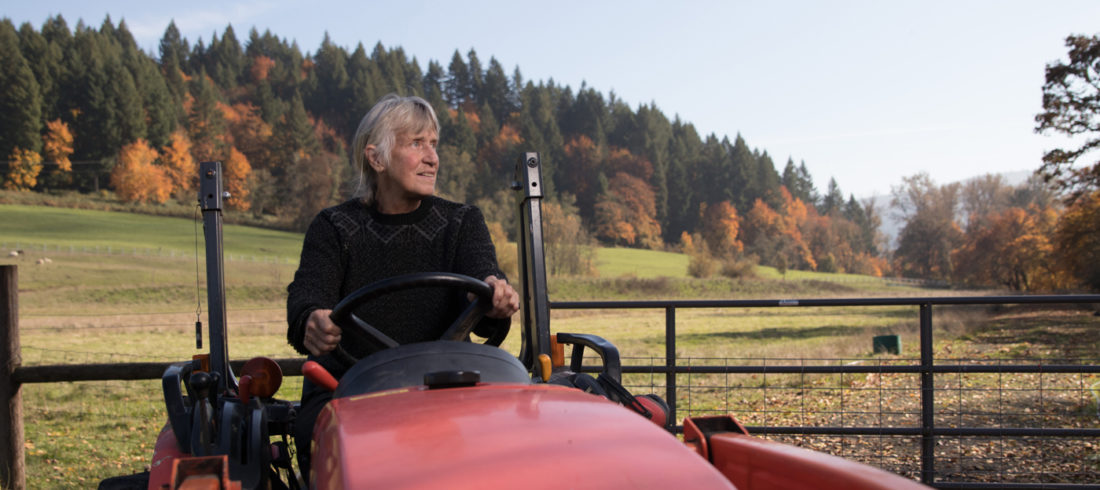 PHOENIX FARM ENTERPRISES
PHOENIX FARM ENTERPRISES
Less than a decade ago, Angela Andre launched Phoenix Farm Enterprises as a nonprofit demonstration project east of Springfield on land leased from the McKenzie River Trust. For the last four years, Andre has directed Phoenix Farm as a for-profit “agripreneurial” business with a special commitment to educational programs oriented to student farmers, agricultural business partnerships, farm internships, and farm training programs.
Andre and the Phoenix agripreneurial trainees are involved in all aspects of farm production including goat herd management, poultry, lamb and rabbit production, vegetable production, marketing, construction, and equipment maintenance, along with budget planning and bookkeeping. Upcycling and recycling materials are important components in Phoenix operations.

Phoenix Farm can be best described as a group of farmers and food crafters working together to integrate all aspects of the farm operation to produce quality, sustainable food for the community. CSA distribution, farmers markets, and restaurant sales are key revenue sources for the farm.
“We wouldn’t be able to farm here like we do,” Andre says, “if the community didn’t locally source foods.”
Phoenix Farm Enterprises
36986 Camp Creek Rd., Springfield
541/510-8888

GROUNDWORK ORGANICS
Sophie Bello and Gabe Cox partnered up in 2001 to establish Groundwork Organics on eight acres of leased farmland bordered by creeks flowing into the Willamette River. They’d earlier worked on nearby organic farms and were familiar with the local farmers market scene. Today, they own 150 acres of highly productive farmland that includes a retail farm stand, a spread of greenhouses that extend the local growing season, and a robust CSA operation providing weekly boxes of produce to hundreds of area residents.
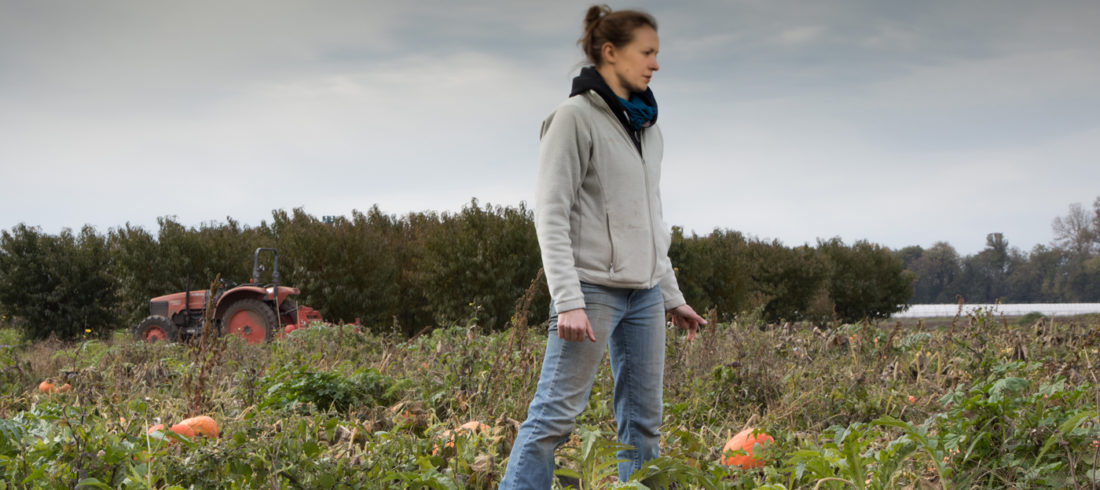
Local farmers markets make up 40 percent of Groundwork’s business. Another 40 percent of the business involves wholesale distribution to restaurants and natural food stores. CSA sales—now coming into their 17th year—hold the remaining 20 percent of the business.
Fruits, vegetables, flowers. Product diversity is a hallmark of Groundwork Organics. And Bello and Cox take special pride in finding and successfully growing unusual crops. CSA boxes, for example, might include produce ranging from baby bok choi to melons to Italian eggplants to Canadice grapes.
“If you know what you’re doing,” Bello says, “the market is there!”
Groundwork Organics
91360 River Rd., Junction City
541/998-0900
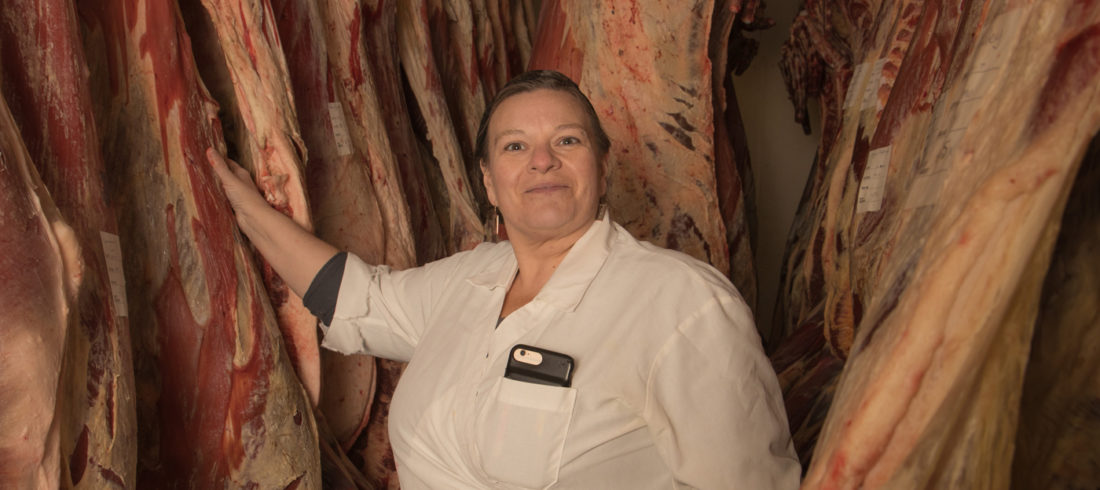
MOHAWK VALLEY MEATS
Mohawk Valley Meats is the only butchery in the Willamette Valley that is USDA and Oregon Department of Agriculture certified. These include USDA approval as an organic meat processor and other certifications for meeting animal welfare standards.
Mohawk is family owned. Denise Pohrman manages the plant and supervises three generations of family members working on site. The business started in 1978 when Pohrman’s mother started selling meat out of a tiny shop in Springfield. The meat was purchased on credit by Pohrman’s father who worked in a slaughterhouse in Harrisburg.
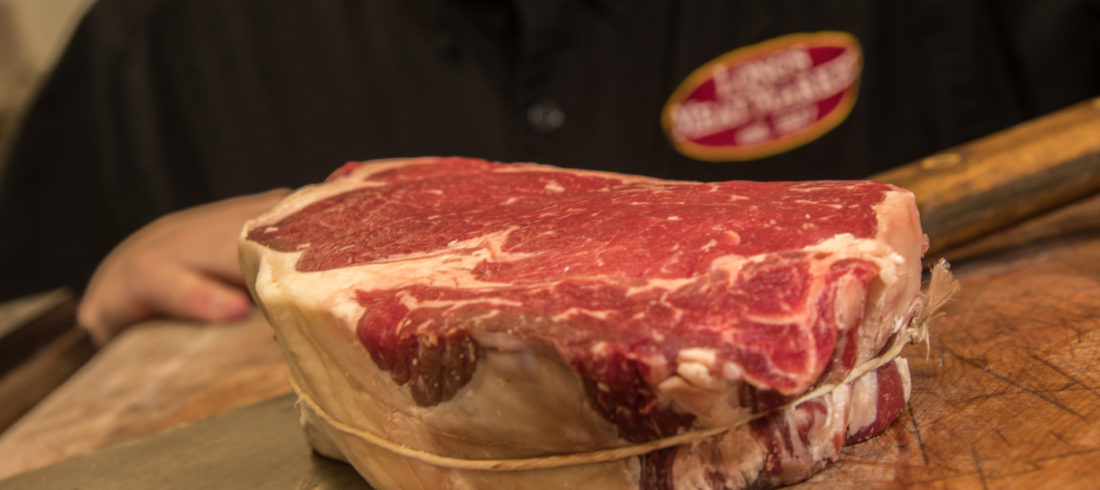
Mohawk serves mostly Oregon ranchers. Its customers include some of the region’s best-known meat producers and retailers: Deck Family Farm, Knee Deep Cattle Co., Long’s Meat Market, Thistledown Farm, and Northern Lights Christmas Tree Farm. Many meats processed by Mohawk are private label branded, including their retail division, Bright Oaks in Springfield, known for its premium sausage and jerky.
“I honestly think the value of supporting your neighbors’ interests is so important,” Pohrman says. “And supporting your neighbors is attained by buying local.”
Mohawk Valley Meats
91167 Marcola Rd., Springfield
541/746-4411


